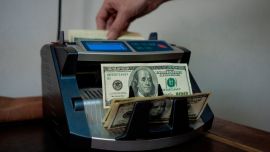With five months to go for the October midterms, President Javier Milei’s government seeks to advance with measures destined to bolster the revival of the economy – a factor considered the key to electoral success.
“This triumph carries a lot of responsibility,” was the praise from Economy Minister Luis Caputo after last Sunday night’s celebrations when La Libertad Avanza surprisingly won the local elections in a key district for its national impact and because the internal dispute with Mauricio Macri for the field right of centre was at stake.
The libertarian administration wishes to accelerate some measures considered the key to fuelling an economy still suffering major limitations.
The most ambitious chapter is to give millions of Argentina with dollars in safety deposit boxes the incentives to use them to buy consumer durables or other items.
President Milei has already explained that anybody whitewashing dollars will not have to render any accounts as to their origin while also guaranteeing that there can be no future persecution by ARCA tax bureau should a different political party come to power.
This issue is what most worries those saving in dollars, who question the constant political changes in Argentina.
Faced with that scenario, Milei has already decided to end the controls against money-laundering by banks and others such as supermarkets via the reports of suspicious operations (ROS), describing those reports as a “horror.”
The government objective is to bring in capital to expand the supply of foreign currency, or “endogenous dollarisation” as they call it.
In Argentina its history of erratic fiscal changes and the expropriation of money represented by the corralito in 2001 and 2002 has convinced savers to hoard more than US$250 billion “under the mattress,” safety deposit boxes and abroad, according to estimates.
To draw closer to those savers, Milei has branded them “heroes” for having prevented the political caste from taking away their savings.
"They did not place their dollars under the mattress because they hate their country; they did it because at the other end was a bunch of sons of bitches and criminals who swindled them with the inflationary tax," fired off the President in a recent 4t3 interview.
Experts agree that to have minimal success, the government will have to provide incentives to attract those dollars, which could include tax cuts.
Among the controls to be eliminated are the obligation of shopkeepers, credit cards, private schools and others to inform about expenditure exceeding determined limits, with even high apartment building charges having to be reported by condo administrations.
The big challenge will be how to relax the controls without running the risk of the country being sanctioned by the organisations which combat money-laundering, like the Financial Action Task Force (FATF).
The government launched a fiscal "whitewash" last year which helped to double Argentine dollar bank deposits by comparison with early 2024, topping US$30 billion. Milei and Caputo believe that there are other windows of opportunity to convince more people to bring their dollars into the system.
by José Calero, Noticias Argentinas




















Comments